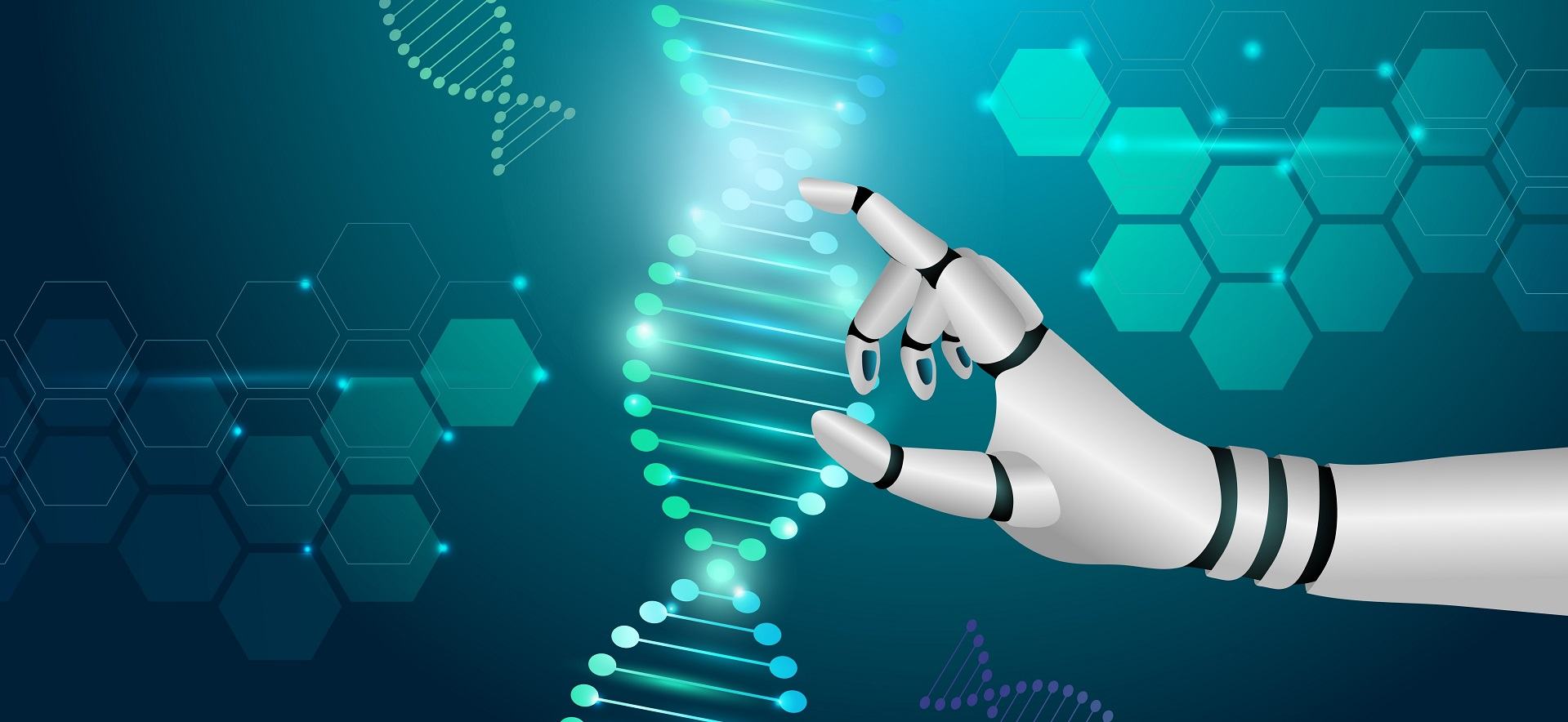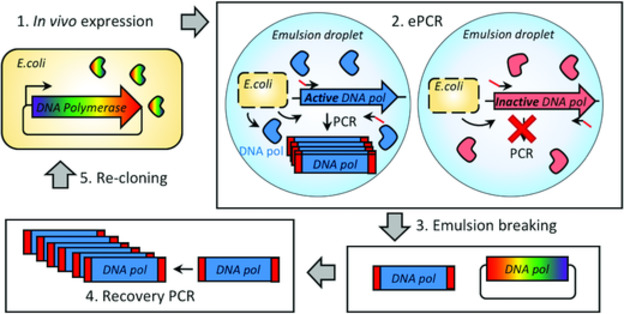Compartmentalized Self Replication (CSR) Technology
- Home
- EnzymoGenius™ Technology
- Compartmentalized Self Replication (CSR) Technology
































Compartmentalized Self Replication (CSR) technology is an advanced directed evolution method that is widely used in the development and optimization of polymerases and other enzymes. CSR technology mixes oil and water to form tiny water-in-oil systems. Each system is equivalent to a separate isolation chamber, which contains Escherichia coli, primers for Taq DNA polymerase, PCR buffer and dNTPs. These systems maintain high stability under high temperatures and allow E. coli to release Taq DNA polymerase through pre-heating denaturation. Subsequently, in a PCR cycle, mutants with high activity were amplified using their own genes as templates, and meaningless mutants were eliminated. Finally, excellent mutant genes can be obtained by purifying the enriched DNA products.
 General CSR concept and procedure schematic. (Abil Z, et al., 2018)
General CSR concept and procedure schematic. (Abil Z, et al., 2018)
CSR technology not only improves the activity, specificity and stability of polymerase, but also provides an efficient solution for genomic amplification. For example, scientists have improved the phi29 DNA polymerase through CSR technology to provide better genomic coverage at higher temperatures. In addition, CSR technology is also used to develop new nucleic acid polymers, such as adding heterologous nucleic acids through the "differentiated self-signing"(CST) technology.
We are dedicated to applying CSR technology to provide our customers with high-quality, innovative biotechnology solutions. Our team is highly experienced and can modify the detailed project process according to customer specifications in order to ensure clarity and efficacy at every phase of the project. Through our professional services and technical support, we think we can make customers speed R & D, save R & D cost and produce high-quality research outputs.
Compartmentalized Self Replication (CSR) technology has the following advantages:
Efficient directed evolution
CSR technology can strictly select the most active polymerase by self-replicating in an isolated space, thereby achieving efficient directed evolution.
Strong phenotype-genotype linkage
CSR technology uses oil-in-water emulsions to form separate isolation chambers, ensuring a strong linkage between phenotype and genotype, allowing better adaptive mutants to better amplify their genes.
High-throughput screening capabilities
CSR technology combines high-throughput screening and selection methods to quickly screen out polymerase variants with desired characteristics.
Improved stability and tolerance
CSR technology can remain stable under high temperature conditions and significantly improve the thermal stability and resistance to inhibitors of the polymerase through multiple rounds of selection.
Wide application range
CSR technology is not only suitable for the evolution of polymerases, but can also be extended to other enzymes, such as nucleotide diphosphate kinases, etc., and has wide application prospects.
Compartmentalized Self Replication (CSR) technology is a directed evolution strategy mainly used to screen and optimize the performance of DNA polymerases. The following is a summary of the application of CSR technology:
Improve the thermal stability of polymerases
CSR technology is applied to the identification of polymerases with better thermal stability, including Taq DNA polymerase and Phi29 DNA polymerase.
Enhance polymerase tolerance to inhibitors
CSR screening is able to detect variants of Taq DNA polymerase with enhanced resistance to PCR inhibitors (heparin and phytic acid).
Improving reverse transcription activity of polymerase
CSR technology was used to screen Thermococcus kodakaraensis DNA polymerase with reverse transcription activity.
Optimize the sensitivity and stability of PCR testing
CSR technology improves the sensitivity and stability of PCR testing and reduces reaction time and costs through self-replication under rapid PCR cycling conditions.
Screening for salt-tolerant polymerases
CSR technology has derived a method called salt-tolerant segregated autoreplication (stCSR) for screening salt-tolerant polymerases.
High-throughput screening of CRISPR-related RNAs
CSR technology inspired a method called Compartmentalized CRISPR Reaction (CCR) for high-throughput screening of the activity and stability of multiple gRNAs.
Compartmentalized Self Replication (CSR) technology is a strategy for polymerase directed evolution by isolating an individual's self-replicating reactions in a water-in-oil emulsion. Here are some common questions about CSR technology and their answers:
Q: What is CSR technology?
A: CSR technology is a strategy to achieve directed evolution of enzymes (especially polymerases) by isolating individuals 'self-replicating reactions in water-in-oil emulsions. This approach ensures that each polymerase only copies its own coding gene, allowing a direct connection between phenotype and genotype.
Q: How does CSR technology work?
A: CSR technology uses water-in-oil emulsions to form tiny isolation chambers, each containing Escherichia coli carrying Taq DNA polymerase mutant, dNTPs, PCR buffer and primers. Under high temperature conditions, Escherichia coli releases Taq DNA polymerase. Through PCR cycles, under screening pressure, mutants with high activity are PCR amplified using their own genes as templates, and nonsense mutants are eliminated.
Q: What are the application areas of CSR technology?
A: CSR technology is widely used in the directed evolution of polymerases, especially in improving the thermal stability and anti-inhibitor ability of polymerases, and optimizing the sensitivity and stability of PCR detection. In addition, CSR can also be extended to the directed evolution of other enzymes, such as nucleotide bisphosphate kinases (NDK) and RNA replicases.
Q: What are the advantages of CSR technology?
A: The main advantage of CSR technology is its efficient, high-throughput screening capability, which can screen polymerase variants with desired characteristics in a short period of time. In addition, CSR can effectively select more adaptable mutants through strict phenotypic and genotype connections and optimize polymerase activity under specific conditions.
Q: How does CSR technology affect PCR testing?
A: CSR technology can significantly improve the sensitivity and stability of PCR detection and reduce reaction time and cost. For example, Taq DNA polymerase mutant developed through CSR technology shows higher primer template affinity and anti-inhibitor ability than wild type, allowing efficient amplification in complex biological samples.
Q: How is CSR technology different from other directed evolution methods?
A: Compared with other directed evolution methods, CSR technology has unique spatial isolation characteristics, allowing each mutant to only copy its own gene, thus ensuring the accuracy and efficiency of the selection process. The design of this feedback loop allows better adaptive mutants to better amplify their genes.
Q: What are the limitations of CSR technology?
A: Although CSR technology performs well in directed evolution of polymerases, it also has certain limitations. For example, CSR technology is mainly suitable for polymerases that can self-replicate their own genes, which limits its applicability in certain special applications.
Please take a moment to fill out the form.
CD Biosynsis
Copyright © 2025 CD Biosynsis. All rights reserved.
